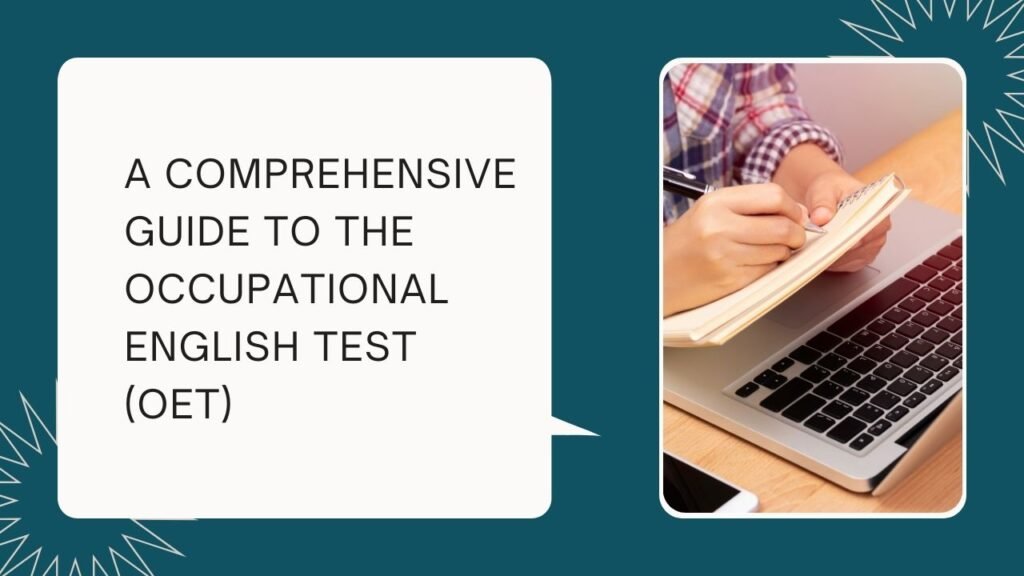In the ever-evolving landscape of global healthcare, effective communication is paramount for professionals seeking opportunities in English-speaking countries. The Occupational English Test (OET) emerges as a specialized language proficiency examination tailored for healthcare practitioners. This comprehensive guide aims to shed light on the intricacies of the OET, offering valuable insights into its purpose, structure, application in the UK, and a comparative analysis with other language proficiency tests, such as IELTS.
What is the OET?
The OET stands as a testament to the increasing demand for linguistic proficiency among healthcare professionals. Unlike generic language assessments, the OET is meticulously designed to evaluate all four language skills – listening, reading, writing, and speaking – within the specific context of healthcare settings. This ensures that candidates are not only proficient in English but can effectively navigate the nuanced communication scenarios prevalent in the medical field.
Where can I use OET on my road to the UK?
Aspiring healthcare professionals eyeing the UK as their destination of choice will find the OET indispensable. Recognized by prominent healthcare regulatory bodies and Higher Education Institutions (HEIs) in the UK, including the General Medical Council (GMC), Nursing and Midwifery Council (NMC), and the Royal College of Veterinary Surgeons (RCVS), the OET facilitates the journey towards registration, study, and employment in the UK healthcare sector.
Structure of the OET Course
Listening
The Listening sub-test, spanning approximately 50 minutes, comprises two parts: health professional-patient consultations and workplace dialogues. This segment assesses a candidate’s ability to comprehend and respond to real-life healthcare interactions.
Reading
Comprising two parts and lasting 60 minutes, the Reading sub-test delves into texts relevant to general healthcare contexts and the workplace. Candidates are challenged to extract critical information and demonstrate comprehension.
Writing
In a profession-specific, 45-minute sub-test, candidates face tasks grounded in typical workplace situations. The Writing segment evaluates the ability to articulate thoughts and information effectively within the healthcare domain.
Speaking
The Speaking sub-test, delivered individually over 20 minutes, involves profession-specific role-plays. This segment examines a candidate’s ability to communicate verbally within the specialized context of healthcare scenarios.
Required OET Score for PLAB & GMC Registration
For those aiming at PLAB and GMC registration, a minimum score of 350 (equivalent to a grade B) is imperative in each of the four sub-tests of OET Course. This benchmark ensures that healthcare professionals possess a robust command of the English language, vital for their roles in the UK.
How Much is This Exam Going to Set Me Back?
As of 2023, the cost of undertaking the OET globally is $587 AUD. This investment is a pivotal step toward unlocking opportunities for healthcare professionals on their path to global career advancement.
Required ID Documents
Candidates must present a valid passport or national identity card at the test center, underscoring the importance of proper identification in the examination process.
When and Where is This Exam Available?
The OET is accessible at more than 140 venues across 42 countries, with 14 test dates scheduled annually. This widespread availability enhances the accessibility of the OET for healthcare professionals worldwide.
What to Study for OET?
Preparation for the OET demands a dual focus on honing English language skills and developing an intimate understanding of the healthcare environment. A plethora of online resources, including practice materials, sample tests, and preparation courses, are readily available to aid candidates in their journey toward success.
IELTS vs OET
While both IELTS and OET assess English language proficiency, the latter is custom-tailored for healthcare professionals. With a focus on real healthcare scenarios, the OET proves to be more relevant to the daily challenges faced by medical practitioners, making it the preferred choice for many in the healthcare sector.
Frequently Asked Questions
Is OET mandatory to obtain GMC registration?
Yes, OET is one of the accepted English language proficiency tests for GMC registration, ensuring that healthcare professionals meet the linguistic standards required for practice in the UK.
If I take OET, will I have to take IELTS?
No, successful completion of the OET negates the necessity of taking IELTS. The OET, specifically designed for healthcare professionals, provides a comprehensive assessment of language skills.
I have been trying for IELTS, but should I take OET instead?
Healthcare professionals encountering challenges with IELTS may find OET more suitable due to its tailored approach that aligns closely with the demands of the healthcare sector.
Is OET accepted for training post application?
Indeed, OET is accepted for training post applications in the UK, further emphasizing its relevance and acceptance within the British healthcare system.
Is OET easier than IELTS?
The difficulty level may vary based on individual preferences and strengths. However, many healthcare professionals find OET more aligned with their field, making it a preferred choice over IELTS.

